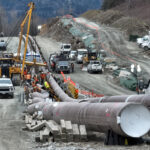From Bloomberg
The Canadian government is likely to proceed with expansion of the Trans Mountain oil pipeline when it announces its decision next month, officials familiar with the matter say.
The government has made no secret about its interest in finding a way to expand the conduit, but has tiptoed around the matter to avoid opening any decision up to legal challenges that have already delayed the project — and things remain fluid as consultations continue. However, with a June 18 decision approaching, the government is likely to proceed with the expansion, the officials said, speaking on condition of anonymity because the they’re not authorized to speak publicly.
Prime Minister Justin Trudeau has begun signaling his interest. “The only way to do it is to do it responsibly, and that’s what we’re doing. The need for it, and the national interest, is clear,” he said on April 30. However, to rush ahead without appropriate consultation “would be a guarantee you would continually be bogged down in the courts for the years to come.”
While the government will likely move forward, it’s possible but unlikely it could again extend the deadline to allow for more consultation, the officials said. The government almost certainly won’t flat-out abandon the expansion that day, the officials said. Trudeau’s cabinet will meet the morning of June 18 and is expected to make its decision then.
A spokesman for Natural Resources Minister Amarjeet Sohi said only it was the government’s goal to make a decision by June 18. “We have been clear that a decision on the proposed Trans Mountain Expansion Project will only be made once we are satisfied that we have met our duty to consult and accommodate indigenous groups, where appropriate,” spokesman Alexandre Deslongchamps said in an email. “We know how important this process is to Canadians. We are working each day to get it right.”
Approval Framework
The government bought the pipeline last year in a bid to save its expansion, only to see a court strike down the permit. That ruling set out a framework for an approval that would pass legal muster: added regulatory review, which has since been completed, and more consultation with indigenous communities. The government extended the deadline to June 18 to allow those talks to continue.
The political implications for Trudeau are complicated — the pipeline is popular in Alberta, where he has little hope of any gains in this year’s election, while it’s decidedly more controversial in British Columbia, a key electoral region. Building the pipeline may burnish Trudeau’s economic record but could also potentially alienate voters, particularly as polls show him bleeding support to the Green Party.
Jason Kenney, the premier of oil-producing Alberta and an advocate for the project, said last week he expects it to move ahead. “After all, the federal government owns it now, so they’d better. Having said that, we don’t just need one coastal pipeline,” he said in a BNN Bloomberg interview. Kenney, elected last month, has vowed to strike a more combative, pro-oil tone as premier.
The Trans Mountain expansion would nearly triple the capacity of a line that runs from Alberta to the Vancouver region. The country’s budget watchdog has estimated the expansion’s cost at C$9.3 billion ($6.9 billion), on top of the purchase cost, which was about C$4.2 billion after capital gains taxes paid back to the government on its purchase.
Canada has been grappling with a pipeline capacity crunch that sent crude prices plunging late last year to as low as $13.46, and led the province to force a temporary production cut. Prices for Western Canadian Select have since recovered to around $50.







